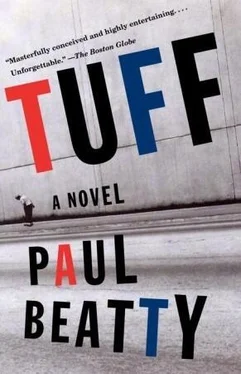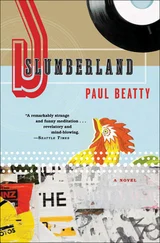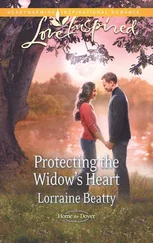Fariq tossed Winston his cellular phone. “Well, call somebody who cares, you big bitch.”
“Don’t be like that, Smush,” Yolanda pleaded. “Say something to him. He just trying to turn his life around but he don’t know how.”
Fariq waved her off. “Tuff like a big ol’ battleship that sees some torpedos heading right for it. He want to turn on a dime and spin out the way, but he can’t. Too much momentum. Nigger too big. Moving too fast. Tuff gots to deal.”
“And y’all supposed to be boys. You not right, Fariq.”
Winston had Fariq’s slightly damaged cell phone pressed to his ear. “Hello, Big Brothers of America? … Yeah, I need a Big Brother.… No, I don’t want to be a Big Brother, I need a Big Brother.… How old am I? Twenty-two … Too old? To whom am I speaking? … Mr. Russo? Mr. Russo, you don’t send a nigger to 291 East 109th Street, you going to wish you had.… Foshay. Winston Foshay.” Laughing, Fariq flipped his business magazine in the general vicinity of the trash barrels. “Motherfuckers is hopeless.”
Feeling better, Winston walked back to the stoop. He handed Fariq his phone and took the bottle of rum from Inez. Unscrewing the pink top, he downed a capful of liquor. “Wooo! Yeah, this’ll do.” Slowly, he circled Der Kommissar, liberally splashing the pungent spirits around the carcass.
“Winston, what are you doing?” asked Inez.
“Standing on that manhole cover, looking down, I had a thought.” He took another sip, this time eschewing the cap. “Ms. Nomura, how many books have you given me to read over the years? About thirty?”
“I guess.”
“You know how many of those I read? Two: Go Tell It on the Mountain and Musashi . And out of those two books I remember nothing from Go Tell It on the Mountain , and one chapter from Musashi .” Winston asked Charles for some matches. He struck one and threw it onto the ring of rum. Suddenly the dog was encircled by an ankle-high wall of fire. “Miyamoto Musashi a samurai, right? Nigger trying to find the way of warrior and shit. Killed umpteen motherfuckers and still don’t know any more than when he hadn’t killed nobody. So one day he asks a monk for some advice. ‘Show me the way’ and shit. With a stick the monk draws a circle in the dirt around Musashi and walks away. Musashi like, ‘What the fuck?’ ”
Charles handed the blunt to Nadine. “Nigger, I’m like, ‘What the fuck?’ ”
Winston pressed on. “Musashi stood in that circle for hours trying to figure out what the monk meant. Finally he has a revelation; he and the universe are one. The circle is like time and space, never-ending.”
“Yo, Tuff, you do not need to be smoking no weed. You have lost your fucking mind. On the strength, just say no to drugs.”
Winston spread his arms out wide as he could. “Extend the circle, its edges go the ends of the universe.” He closed his arms and made a small circle with hands. “Shrink the circle, it becomes size of your soul.”
Inez and Winston shared a knowing smile: the Big Brother from the agency would be his monk. Winston poured the rest of the rum over Der Kommissar’s body, inadvertently spilling some on Bendito Bonilla, who, still unconscious, was perilously close to the fire. Winston nudged him out of harm’s way with the side of his foot, then tossed the bottle back to Inez. But before he could light another match, Charley O’ flicked the remainder of his joint onto the dog. A column of black smoke rose into the air, and underneath it the dog’s fur crinkled and its hide sizzled.
“You a hostile person, Tuffy. You got some issues,” Yolanda said from behind Winston, stepping over Bendito Bonilla and joining him outside the funeral pyre. She saddled Jordy on Winston’s shoulders. Fariq was bent over Bendito, probing the officer’s slow-breathing torso with his crutch.
Peering over his shoulder, Inez swallowed a mouthful of rum and asked how long Bendito would be unconscious.
Fariq stood up and said, “I don’t know, but he ain’t been out that long, about five minutes.”
“I thought knocking someone out with one punch was some ‘manipulative Hollywood bullshit.’ ”
“No, that shit is on the real. Cockstrong nigger, nice with the hands, like Tuffy, catch you right, forget about it. I seen niggers knocked unconscious for twenty, thirty minutes. Motherfuckers pissing on ’em and shit.” He unzipped his fly and straddled Bendito. “Come to think of it …”
Rabbi Spencer Throckmorton cajoled his temperamental 1966 Ford Mustang onto East 112th Street. “There it is,” he said aloud, turning down the volume on his eight-track player and leaning across the passenger seat for a closer look at a brick building in the middle of the block. “It” was Congregation Tikvath Israel of Harlem, the last synagogue in Harlem. Six years had passed since Spencer had visited Spanish Harlem, and in the temple’s place was La Iglesia de Santo Augustine.
Spencer double-parked the car. He stood on the sidewalk and stared at the brownstone. The building’s remodeled facade was in excellent shape. A new gutter lined the roof and ran down the sides of the church. The cracks under the second-story windows were filled and smoothed with spackle. The cement Star of David carved in the pediment above the doorway was gone, replaced by a generic etching of the Son of God and two hovering angels in prayer. But to Spencer’s joy, buried under countless coats of paint, a small mezuzah remained nailed inside the doorjamb. In restoring the building, the Catholics, as usual, had done an excellent job of presenting the big picture without paying much attention to detail.
During his last year of rabbinical school Spencer served his internship under Rabbi Abe Zimmerman at Congregation Tikvath Israel of Harlem — or Constipation Tic Bath Unreal of Harlem, as the rabbis liked to refer to it while dusting the holy scrolls. The Jewish population of Harlem, once numbering over 100,000, had long since evaporated. When Spencer interned at Congregation Tikvath, the membership rolls listed twenty worshipers, twelve of whom were ambulatory, the rest attached to life-support systems at Mount Sinai Hospital. Two of the more regular worshipers weren’t even Jewish: Oscar and Rosa Alvarez, a Puerto Rican couple who loved to listen to the cantor, Samuel Levine, sing his solos (“ Dios mío , he sounds like Caruso”). Sometimes in the midst of Levine’s chanting “Shema! Adonai elohenu, Adonai echad!” Oscar, moved to the depths of his soul, would wail “Changooo!”—his invocation of the Yoruba god — momentarily bringing the solemn services to a halt. “ Lo siento! Lo siento! It won’t happen again.”
On the last Rosh Hashanah Spencer celebrated in the temple, he convinced Rabbi Zimmerman to let him bring in the New Year with a call from the shofar that would rattle the windows. He blew from the diaphragm, as Rabbi Zimmerman had advised, but all he produced was a garbled, flatulent tone. A quarter of the congregation died that year, and Spencer felt as if he were the most undesirable of God’s chosen people.
Spencer started the Mustang’s ignition, then leaned on the horn for a solid minute. Blindly plunging his hand into the mountain of cassettes on the dashboard, he shoved a pink Loggins and Messina tape into the eight-track player and double-checked the address taped to the sun visor: Winston Foshay, 291 East 109th Street, first floor.
Why the media paid so much attention to the crisis of the black family was a mystery to Spencer. His father, a successful mortician, was a constant presence in his life, and the parade of greedy wives had provided Spencer with an overabundance of mothering. Spencer grew up in Palmer Hills, a black upper-class enclave of Detroit. Well-rounded and comfortable as his childhood was, it prepared him for nothing but cocktail-party patter and entry into a prestigious university. When he wasn’t attending weekend classes in classical piano, jazz trombone, ice skating, Chinese calligraphy, or conversational Swahili, he was drag-racing through town in his sixteenth-birthday present, a mint-condition Mustang convertible.
Читать дальше












